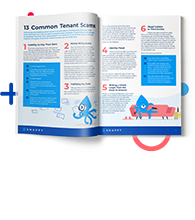
Noah Goldman
Chief Operating OfficerIn this article
Are you pregnant? In what country were you born? Are you on food stamps? What religion are you? Do any of these questions sound familiar?
Today’s landlords and property managers must understand what they can and cannot ask their prospective tenants – or risk legal action.
While it’s essential to gather pertinent information to make smart decisions during the tenant screening process, there are specific questions you should always steer clear of due to their legal implications or discriminatory nature.
In this article, we dive into the illegal rental application questions you should never ask and offer expert guidance on what questions you should ask instead.
Get our free guide to uncover the latest rental scams and how they’re costing properties thousands.

List of Illegal Rental Application Questions
In case you weren’t aware, the Fair Housing Act (FHA) is a federal regulation that protects specific categories of individuals who are more likely to experience discrimination.
This means that property managers can’t deny housing to prospects based on any of the following protected classes:
- Marital and familial status
- Race/color
- National origin
- Religion
- Sexual orientation or gender identity
- Disability
- Age
Here, we take a closer look at each group of people and what questions you should avoid as a landlord or property manager:
Marital and/or Familial Status: Inquiring about an applicant’s marital status is considered discriminatory because it does not affect their ability to fulfill their rental obligations. Any questions related to whether they have children or plans to have children are also off-limits, as they violate FHA laws protecting families with kids.
Race/Color: Commenting on a prospective renter’s skin color or overall looks is illegal. While you may think a comment such as, “With those dark eyes, you look Greek,” may sound like a compliment, it’s actually illegal. It’s important to understand that anyone can report any landlord who asks for discrimination.
National Origin: Asking applicants about their national origin, ethnicity, or citizenship status is discriminatory and violates fair housing laws.
Religion: Inquiring about a potential renter’s religious practices is considered discriminatory and irrelevant to their qualifications as a tenant.
Sexual Orientation or Gender Identity: Questions about any applicant’s sexual orientation or gender identity are insensitive – and discriminatory – and have no relevance to their eligibility as a reliable renter.
Disability: Inquiring about someone’s disability or medical history is illegal under the FHA, which prohibits discrimination based on disability status.
Age: Asking about a prospective tenant’s age can be interpreted as discriminatory, especially against older people who are protected under the Age Discrimination in Housing Act. Unless your rental property offers, for example, senior citizen discounts on rent or is a senior retirement community or nursing home, inquiring about someone’s age is inappropriate and illegal.
What Questions You Should Ask Instead
It’s a smart strategy to have a comprehensive screening process for applicants.
The best approach is a consistent and clear application process. It also means understanding what type of information is OK to avoid risk and violating tenant protections — and to protect yourself from a bad renter.
At a fundamental level, landlords need to know a few things about any applicant, such as:
- Can they afford the rent and pay on time each month?
- Are they open to a move-in/move-out timeline that lines up with your rental unit’s availability?
- Will they be a safe, respectful renter?
- Do they agree to allow you to verify their personal reference, background, and credit check information?
Here are some additional topics that are acceptable to discuss with potential tenants:
Income and Employment: Instead of asking about marital status or family plans and/or size, inquire about the potential tenant’s income and employment status. Always request proof of income, such as pay stubs or tax returns, to determine their ability to pay rent.
Rental History: Ask for specifics about the applicant’s rental history, like previous addresses, landlord references, and reasons for leaving other rentals. This can uncover details about their overall reliability.
Credit History: Get permission to run a credit check to assess a prospect’s financial responsibility and account of timely payments.
Criminal Background: While it’s OK to ask about a possible renter’s criminal background, keep fair housing laws in consideration. Some states don’t allow criminal background reports to be included in a screening process.
Number of Occupants: Instead of asking about family status or children, you can inquire about the number of people who will live in your rental unit. Remember, it helps ensure occupancy limits and zoning regulations compliance, which ultimately fall on the landlord.
Pets: If the answer is yes about having pets, it is OK to ask the animal’s breed and size. Establish clear pet policies about pet deposits, restrictions, and any additional fees. Remember, you can’t prohibit service animals or emotional support animals, even if they are a restricted breed.
Preferred Move-In Date: Find out about the potential renter’s preferred move-in date to determine lease start dates and ensure a smooth transition for both parties.
Some Final Thoughts
By revising your rental application questions to focus on relevant information, including income, rental history, and creditworthiness, you can make the screening process more efficient while abiding by fair housing laws and respecting renters’ rights.
In addition, staying informed about local, state, and federal housing laws is essential to maintaining a legal and unbiased rental application process.